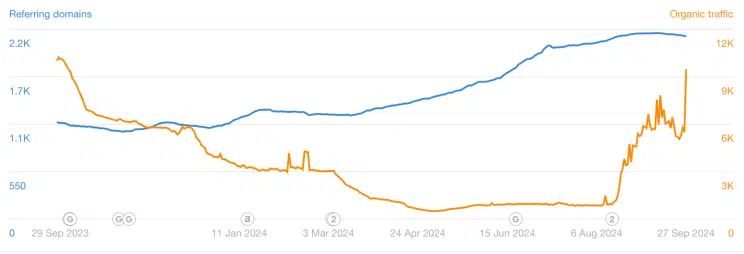The past year has been a rollercoaster for publishers navigating an increasingly crowded web. With competition rising and AI shaking up search results, staying on top of rankings is no small feat – especially in light of Google’s constant updates.
This includes the helpful content update (HCU), which has left many sites struggling to recover from traffic drops and ranking tumbles.
Having experienced this, I’ve learned there’s no one-size-fits-all fix. But we can bounce back by making strategic changes. Here’s how I did it – and what other publishers can learn from the journey.
Dealing with Google’s HCU
I know, I know: Google doesn’t like us to call it the helpful content update anymore. It’s all been baked into search and is just a part of the core! 🎶
The whole thing is a system update, regularly weighting and reinterpreting the various signals.
But the HCU has made life complicated for so many, tumbling rankings, decimating traffic and sending some sites to a tear-filled graveyard replaced with grief, frustration and the feeling that Google just doesn’t care.
I’m no stan for Google and genuinely believe the search giant has made some mistakes. But I’m also not someone who will stand by and do nothing. It’s just not how I’m built.
During last year’s September 2023 helpful content update, my Australian technology website Pickr encountered a new problem. It fell in ranking severely as the HCU rolled out. Like many, I was frustrated, but I wasn’t going to sit and wait.
I tried many things. I pushed out an update I had been working on with more speed. I tried more things. I did research and experimented. I tried a few more things and I took notes.
The March 2024 update came and went, and more falls arrived. Alongside the rest of the affected publisher community, I felt like I was being punished, so I experimented some more.
Notes, trials and tests later, the August 2024 update arrived and the response was immediate: from the first day, my site bounced back.
I had the makings of an HCU recovery. It was a partial recovery, sure, resetting things back to life before the March 2024 update, but it was something.
I’m not sure I’ll ever see a return to the immense traffic from before September 2023, largely because the landscape has changed and the algorithm with it. But I’m hopeful of continued improvement, largely because some of my work appears to be working.
It hasn’t stopped, either. In the spirit of “if you know, you know,” feel free to punch Pickr in your friendly neighborhood tracking tool and see if there’s a recovery.
Simply put, see if my work has worked. I’ll start.


When everything was tallied, I ended up doing dozens of things to improve my site, hoping to make it more helpful.
There wasn’t just one thing that made the most impact, but lots of little things added up to a bigger picture.
While some were specific to my own site, the good news is I’m fairly sure some of it can be repeated for any site.
Publishers can learn from my wins and hopefully see their own by the time the next update rolls around.
It just might require a change in thinking about what the HCU means for them.
1. Take a hard, introspective look your content
A big lesson I’ve learned working in SEO is about doing regular content and page audits. It is beneficial to work out whether what you’re serving is actually good.
Nearly every site owner I speak to seems to believe their work is good. They have a lot of it, some have performed well, and they believe it’s fine. Surely it’s Google’s mistake, right?
The problem is in how you think about your site versus that of others. Your content could be good.
But you also don’t know how good your competitors’ content is. Since Google compares everything, it’s safe to assume your content might not be good enough to compete.
Think about your content realistically. You probably weren’t always an award-winning writer, nor was your team.
You may not have always had the best content, subheads and understanding of a topic.
Your content might also lack a solid linking structure, by which I mean including great internal links, useful external links attributing information other sources have provided and solid context for those links.
In many of the sites I’ve worked on as an SEO specialist, the content balance was a big hurdle.
Simply put, there were a lot of pages everyone was proud of, but no one could wholeheartedly say all of the content was amazing.
It was more like maybe 10–20% were great, and the remainder was, well – not.
Thin, garbage or just plain “meh.” The vibe was clear: we were proud of some, but not everything.
If you have 100 pages, that’s a problem because 10 to 20 are great and the remaining 80 less so.
That problem gets significantly worse as your page count increases.
I spoke to a publisher with 15,000 pages the other week, and I’d have a hard time calling even 10% of what I saw great.


Let’s say Google is looking at everything you submit and attempting to understand your site from that body of work.
Do you feel confident knowing that maybe 10% of what you submit is worthwhile and properly representative of being the best in the category?
This is content that hurts. It may as well come from the “hurtful content update,” but we can also remedy it by conducting an audit.
They’re long, extensive and can be exhausting for both of those reasons.
However, they are also beneficial because you may find content that no longer represents your brand or site. If this happens, you can delete it or simply remove it from the index.
Be critical about what could be hurting you. It could just save your site.
2. Find ways to be more helpful or even useful
While we’re on the subject of being overly critical of your content, let’s consider what the helpful content update was supposed to represent.
Ignoring how unhelpful the update has largely been, Google told everyone that it built the HCU with the sole purpose of being “helpful,” so consider where your site can improve its helpfulness.
It’s ridiculous, I know, but our websites aren’t always helpful, even if we’re trying to be.
They may exist to inform and entertain, but that doesn’t mean they’ll match a definition of “help.”
These aspects are not mutually exclusive, and Google is trying to build a formulaic approach to establishing what “helpful” could mean.
Part of the problem is Google is incredibly ambiguous about the helpful content update.
What even is helpful content? How do you define it when Google is cagey about the concept and won’t properly define it?
If anything, this should have been called the “useful content update,” a name that is just about as ambiguous but at least explains what you’re looking for.
I can’t figure out how to grade helpful content, but useful content makes a lot more sense. I can look at a page and decide what to remove and how to improve the whole thing.
Ask yourself if the elements in each article, post and page are genuinely serving a purpose for users.
Regardless of whether the content is helpful, what can you change to make the experience more useful for all?
- Can you add a table of contents?
- Are your subheads easy to read and follow a standard order?
- Are there things you can do to automatically improve your pages?
- Do forward facing indexed tag or category pages have a use on your website?
- Can you add descriptions to make these pages better?
- What else can you do to improve the usefulness of your website?
Do those things and do them fast. The next update could be just around the corner, and you need to be ready.
Get the newsletter search marketers rely on.
3. Be transparent and don’t lie
And while you’re at it, try not to lie. Depending on how well you know your site, you may be doing it without realizing it.
Not lying is a great message for life. Being truthful generally makes life easier for most because you don’t need to think whether you’ll catch yourself in the act of being deceptive.
The same is true when it comes to Google. Don’t lie to Google because it can work things out quickly.
When I say “don’t lie to Google,” I’m specifically talking about nonsensical updates that are incredibly easy for a comparative search engine to debunk.
Call this the “honest content update,” because search engines thrive on honesty and transparency, like most things in life.


Oh, you said you updated the freshness of an article or page, but the only change was the sitemap’s date?
You’re lying. If I can see it working in SEO, Google can, too. You’re going to waste your time nudging the engine for a crawl.
You say a new author has been added to the site and they made changes to the content.
But why did the only things that have obviously changed are the new author and a new timestamp?
That feels rather a lot like a lie you’ll be caught out in, too.
Much like creating content, updating content takes time and costs money.
It isn’t just hitting “update” on a sequence of posts or forcing the sitemap to say the entire library has been updated when nothing has happened.
We’ve all worked on clients like this, and it’s just not helpful for maintaining clarity.
Instead, try to be as transparent as possible. For instance, if you have an advertising policy referencing how you make money, include it in a menu, like the one at the footer.
Make sure it’s indexed so Google can read it and understand that you’re making the best attempt at being transparent. If you need to reference affiliate connections, do that where you can.
In short, do all the things you can to be honest, because that’s being helpful to users and search engines alike.
And don’t lie about it because Google will know.
4. Fix your technical problems
Every time I do a presentation on search, there’s a part of it reserved for dealing with the problems of running a website. Often, it’s the things we’re not thinking about that Google can see.
For that, you need to turn to Google Search Console’s Pages section and look for errors. Juicy, juicy errors.
Pages that aren’t found that you need to correct and make redirects for. Pages that may be found but set to noindex.
Unintentional or not, it’s a search marketer’s prerogative to determine how to handle these fixes.
I spent months on this process before my HCU recovery, staying up late to fix errors and pages Google could see, then verifying and waiting days or weeks for Google to recognize the changes.
Until one day, it started getting through it all. The erroneous pages finally started to fall and my site was getting healthier.
Yes, we’re all dealing with the ramifications of the HCU, but in cleaning up the problems and issues, we’re dealing with the fallout from what could have also been a “healthful content update.”
That means dealing with the problems at Search Console and also looking at potential issues with other parts of your site.
Look at the code, your robots.txt file and the things that make your website hum and purr, because Google is definitely looking at those, too.
5. Work on your brand
I know it’s tough and, like the vague idea of what “helpful” means, improving your brand isn’t straightforward. But mentions of it do show up over time.
I remember a Google rep years ago mentioning brand pull and marketing your site, saying it wasn’t the search engine’s job – but hinting it could help. I can’t find the exact quote, but it stuck with me.
This year, it seems especially pertinent.
Tom Capper’s excellent research at Moz cleverly suggests what the HCU could have been about, with the crux being brands.
Granted, it’s connected with the domain authority metric Google doesn’t use and a Moz brand score that may or may not be useful. But the research is detailed and well-thought-out and aspects make sense.
It’s a little like the popularity of a search, only it’s connected with the brand of your site or the website your search may be affiliated with.
This doesn’t sound like a trait of a helpful content update but rather one that’s all about important qualities.
Let’s call it the “hallmark content update” and be done with it because hallmarks can infer quality, and that is what Google could be trying to say.
Specifically, that a brand being searched infers just that.
Appearances in the media may be the cause for some, driving up searches of related terms, but so, too, could solid marketing efforts in general.
I’m not suggesting TV and radio will necessarily boost ranking or that they’re easy to get either in the first place, but they could definitely connect with relative search terms.
John Mueller has already poured water on the idea that brand mentions boost ranking, but he didn’t argue for searches around the brand itself.
Indeed, when search picks up in Google Trends, it is a trending search.
It stands to reason that increases in search around brands imply authority per se, necessitating marketing and brand-related actions.


The 3 things I didn’t do
I did much more than what was listed here, but some were very specific to my site. It wasn’t just my site that I worked on that saw improvements.
Every site is different and so will need your attention on what can be done to make a good, positive change for each.
But there were three things I didn’t do, and they’re notable because there are those in the SEO community implying outright that these were reasons why sites gained in position.
They include:
- Complaining about a ranking publicly on social and forums.
- Filling out that Google form.
- Trying to get backlinks beyond writing great content.
I literally did none of these things. Not. A. Single. One.
I didn’t shout about my frustrations and struggles trying to identify how Google could suddenly undervalue my site. Instead, I worked on understanding what could go wrong and tried to devise fixes.
I didn’t fill out that feedback form following the March 2024 update because I didn’t really have the time, and I wasn’t the only one.
It’s difficult enough to fix your SEO alongside doing everything else, and I didn’t put in the extra time for a form I wasn’t sure Google was actively going to care about.
And importantly, despite the regular insistence of Reddit’s SEO community on how important backlinks are for ranking, I didn’t try to get backlinks at all. Not one bit.
You won’t find a single artificial backlink for my site I’ve pursued and I actively push back against clients who infer they need that. You don’t. It’s one factor, but it’s not the be-all, end-all of factors.
There’s a reason Lily Ray gets out a specific GIF when backlinks are mentioned online. It’s a factor that just won’t die because it continues to make SEOs money and is easy to keep making money from.
Backlinks are just one factor and given how many signals there are in the age of AI, it may not even be one that truly genuinely makes much difference.
I did a lot of things, but none were focused on backlinks.
However, I did make changes to the design and fonts, working to find a style that improved overall readability for users.
I focused on delivering greater transparency through administrative pages, focusing on an editorial policy and an advertising policy and even made these easier to find.
I used a noindex tag on certain pages I didn’t want showing up in search results while I created better pages.
Some internal links were marked as nofollow, while others remained active. It’s important to find the right balance.
And there was custom code, media size increases and ensuring that every page a search engine could find was the best it possibly could be for users and engines alike.
Put the time in and talk to SEOs in specific areas
If you’re seeking help to recover from the HCU, find someone who has real experience in your area and has seen actual results.
Ask for their track record, proof and data. If possible, verify their recovery wins using a tracker. Don’t just take SEO advice blindly. You could end up wasting time and money on strategies that don’t apply to your site.
Look for someone who understands your specific issues. If needed, turn to the broader SEO community.
Remember that seeking a second opinion is always an option, just like with a doctor. Many of us are out here willing to help others learn.
Contributing authors are invited to create content for Search Engine Land and are chosen for their expertise and contribution to the search community. Our contributors work under the oversight of the editorial staff and contributions are checked for quality and relevance to our readers. The opinions they express are their own.
